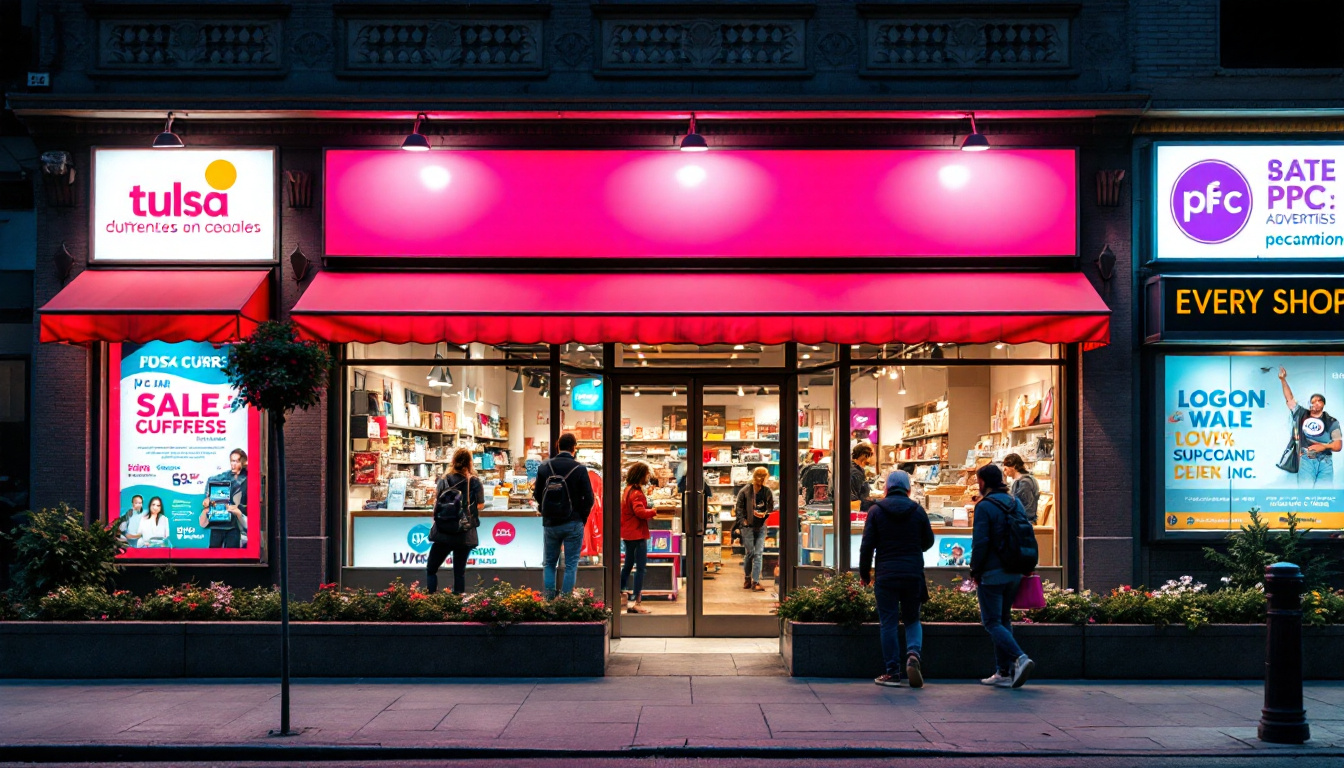Top PPC FAQs Answered for Tulsa, OK Businesses

PPC, or Pay-Per-Click advertising, has gained immense popularity among businesses looking to increase their visibility online. For companies in Tulsa, OK, understanding the intricacies of PPC can help them leverage this tool effectively. This article addresses some of the most frequently asked questions about PPC, providing insights and guidance for local businesses.
What is PPC and how does it work?
PPC is an online advertising model where advertisers pay a fee each time one of their ads is clicked. Essentially, it’s a way to buy visits to your site, rather than attempting to earn those visits organically. Most commonly associated with search engines like Google, PPC allows businesses to bid on keywords relevant to their services or products.
When a user types a query into the search engine that matches these keywords, the search engine displays the ads alongside the search results. The position of these ads is determined by a combination of the bid amount and the quality score assigned by the search engine, which takes into account the ad relevance and landing page quality. This means that even if you have a lower bid, a well-optimized ad can still achieve a higher position if it offers a better user experience.
Key Components of PPC
There are several crucial elements that make up a PPC campaign: keywords, ad copy, landing pages, and bidding strategies. Understanding these components is essential for optimizing your PPC efforts.
- Keywords: The terms that potential customers use when searching for services.
- Ad Copy: The text that accompanies your PPC ad, designed to attract clicks.
- Landing Pages: The web pages users land on after clicking on your ad, crucial for conversion.
- Bidding Strategies: Determines how much you are willing to pay for each click.
In addition to these core components, it's important to consider the role of analytics in a successful PPC campaign. Tracking metrics such as click-through rates (CTR), conversion rates, and return on ad spend (ROAS) can provide invaluable insights into the effectiveness of your ads. By analyzing this data, advertisers can make informed adjustments to their campaigns, optimizing for better performance over time. Furthermore, A/B testing different ad copies and landing pages can help identify which variations resonate best with your audience, leading to improved engagement and higher conversion rates.
Another vital aspect of PPC is the targeting options available to advertisers. Beyond just keywords, platforms like Google Ads offer various targeting methods, including demographic targeting, geographic targeting, and even retargeting strategies. This allows businesses to reach specific audiences based on their interests, behaviors, and locations, ensuring that ads are shown to the most relevant users. By leveraging these targeting capabilities, advertisers can maximize their budget and improve the chances of converting clicks into customers.
Why is PPC important for local businesses?
PPC is particularly beneficial for local businesses looking to attract customers in their vicinity. As people increasingly rely on online searches to find nearby services, having a strong PPC strategy can ensure that your business is visible when potential customers are looking to make a purchase.

For Tulsa businesses, targeting local keywords allows you to connect with your audience effectively. For example, if someone searches for "best pizza in Tulsa," a PPC ad can place your restaurant at the top of the search results immediately, driving local traffic to your business. This immediate visibility can be crucial, especially during peak dining hours or special events, where competition for attention is fierce. By leveraging PPC, you can not only reach customers actively searching for your offerings but also create a lasting impression that encourages repeat visits.
Advantages of PPC for Local Businesses
Utilizing PPC offers multiple advantages to local businesses, including:
- Immediate Results: Unlike SEO strategies that take time, PPC can generate leads almost instantly.
- Targeted Audience: You can target specific demographics, locations, and even devices.
- Control Over Budget: You can set daily budgets that suit your financial capabilities.
- Performance Measurement: Real-time analytics allow you to track and optimize performance continuously.
Moreover, PPC campaigns can be tailored to reflect seasonal trends or local events, allowing businesses to capitalize on specific opportunities. For instance, a local florist could run targeted ads around Valentine's Day or Mother's Day, ensuring that they capture the attention of customers looking for last-minute gifts. This level of adaptability not only maximizes the effectiveness of your advertising spend but also helps in building brand awareness within the community. Additionally, utilizing ad extensions, such as location and call buttons, can further enhance user engagement by making it easier for potential customers to reach out or visit your business directly.
How to select the best PPC platform?
Selecting the right PPC platform can significantly impact your ad campaign's success. Many options are available, each with unique features and audience reach. The most popular platforms include Google Ads, Bing Ads, and social media networks like Facebook and Instagram.

When choosing a platform, consider the following factors:
- Your Target Audience: Where does your audience spend the most time? Search engines or social networks?
- Ad Format: Different platforms offer various ad formats, like text, image, or video ads.
- Budget: Each platform has different pricing models; some might be more economical based on your specific needs.
- Geographic Targeting: Ensure the platform allows precise targeting for your local area.
Evaluating PPC Platforms
Testing and evaluating different platforms can be beneficial. Start with a small budget to measure which platform delivers the best ROI. Gathering analytics after a trial period will help you understand where your advertising dollars are best spent.
In addition to these considerations, it's crucial to stay updated on the latest trends and features offered by each platform. For instance, Google Ads frequently rolls out new tools and enhancements that can optimize your campaigns, such as automated bidding strategies and audience targeting options. Similarly, social media platforms are constantly evolving their advertising capabilities, introducing new formats like Stories or Reels that can engage users in unique ways. Keeping an eye on these developments can provide you with a competitive edge and allow you to leverage the most effective strategies for your business.
Furthermore, don't underestimate the importance of A/B testing within your PPC campaigns. By experimenting with different ad copies, visuals, and calls to action, you can gain insights into what resonates most with your audience. This iterative approach not only improves your current campaigns but also informs future strategies. As you refine your ads based on performance data, you can maximize engagement and conversion rates, ultimately leading to a more successful advertising experience.
What are the costs associated with PPC?
The cost of a PPC campaign can vary widely based on several factors, including industry competition, keyword selection, and campaign goals. Generally, businesses are charged every time a user clicks on their ad, which means cost-per-click (CPC) is the primary metric to monitor.
On average, CPC can range from as low as a few cents to more than $50, especially in competitive industries. Businesses must carefully analyze their budget and adjust their bidding strategies accordingly to maximize impact.
Understanding Bids and Budgets
Setting a daily or monthly budget can help control expenses. Many platforms will allow you to set limits to ensure you do not overspend. Additionally, regularly reviewing your PPC costs can lead to adjustments that improve cost efficiency.
Moreover, it's essential to understand the concept of Quality Score, which is a metric used by platforms like Google Ads to determine the relevance of your ads, keywords, and landing pages. A higher Quality Score can lead to lower CPCs and better ad placements, making it crucial for advertisers to optimize their campaigns. Factors influencing Quality Score include the expected click-through rate (CTR), ad relevance, and landing page experience. By focusing on these elements, businesses can enhance their PPC performance while keeping costs manageable.
Another important aspect to consider is the varying costs associated with different types of PPC ads. For instance, display ads may have a different pricing structure compared to search ads, often based on impressions rather than clicks. Additionally, remarketing campaigns, which target users who have previously interacted with your website, can sometimes yield lower CPCs due to the familiarity of the audience. Understanding these nuances can help businesses tailor their PPC strategies to achieve the best return on investment.
How to measure the success of your PPC campaigns?
Measuring PPC success goes beyond tracking clicks and impressions. Key performance indicators (KPIs) such as conversion rate, cost per acquisition (CPA), and return on ad spend (ROAS) provide meaningful insights into how well your campaign is performing.
To effectively measure success, consider the following steps:
- Set Clear Goals: Define what success looks like for your campaign — be it sales, leads, or brand awareness.
- Implement Conversion Tracking: Use tracking tools to measure actions that matter to your business.
- Analyze Performance Metrics: Regularly review all key metrics to identify trends and areas for improvement.
- Make Data-Driven Decisions: Use the insights gained to refine your campaigns and enhance performance.
In conclusion, PPC can be a powerful tool for businesses in Tulsa, OK, looking to drive traffic and increase sales. By understanding its fundamentals, importance, platform selection, cost implications, and measurement techniques, local businesses can harness the full potential of PPC advertising.

As a Google Ads expert, I bring proven expertise in optimizing advertising campaigns to maximize ROI.
I specialize in sharing advanced strategies and targeted tips to refine Google Ads campaign management.
Committed to staying ahead of the latest trends and algorithms, I ensure that my clients receive cutting-edge solutions.
My passion for digital marketing and my ability to interpret data for strategic insights enable me to offer high-level consulting that aims to exceed expectations.





























